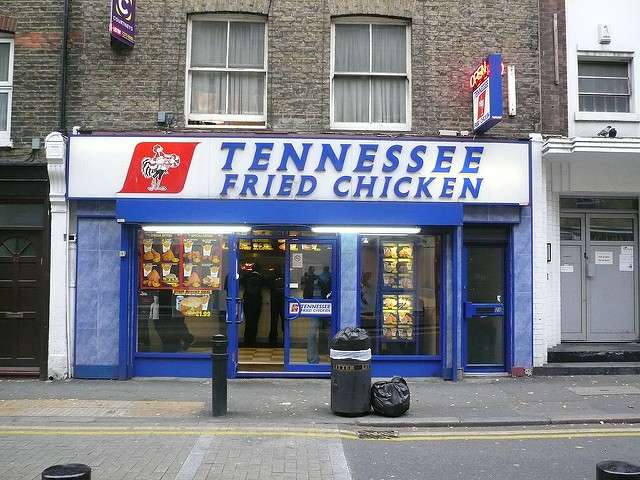Fear of a Fried Chicken
Food politics in Great Britain

Chicken joints are proliferating in Great Britain, Alicia P.Q. Wittmeyer points out in Foreign Policy. "Multiple streets in London and elsewhere now have three, four, or five chicken shops within just a few blocks of one another, marked by their distinct—often red, white, and blue—shiny plastic storefronts, and their names, which gesture toward southern Americana: Carolina Chicken, Tennessee Fried Chicken TFC, Dixie Chicken, Dixy Chicken," Wittmeyer writes. ("Some names, like Miami Chicken, miss the mark a bit," she adds.)
That may sound finger-licking good to you, but Wittmeyer reports that it "has generated a certain amount of angst across the political spectrum":
Much of the anguish over these restaurants purports to be based on health concerns, and, with an obesity rate of 25 percent, Britain might prefer its growth industries to consist of something other than fast food. But some of the chicken-related anxieties…are tinged with sentiments that appear somewhat less savory (so to speak). In an article for the Daily Mail, one author writes about how "the grottier outlets lend an air of seediness and decline to the thoroughfares of many [of] our cities and towns, sharing customers with those other symptoms of modern urban deprivation: pound shops, betting shops and payday loan operators." Somehow, fried chicken has become a quick stand-in for the ways modern life has gone wrong.
From there Wittmeyer goes on to explore the anxieties about race and class that have helped fuel the chicken angst—and along the way, she explains how fish-and-chips, before it became Britain's national dish, was once a meal maligned by anti-Semites because they thought it was too Jewish. You should read the whole thing.
